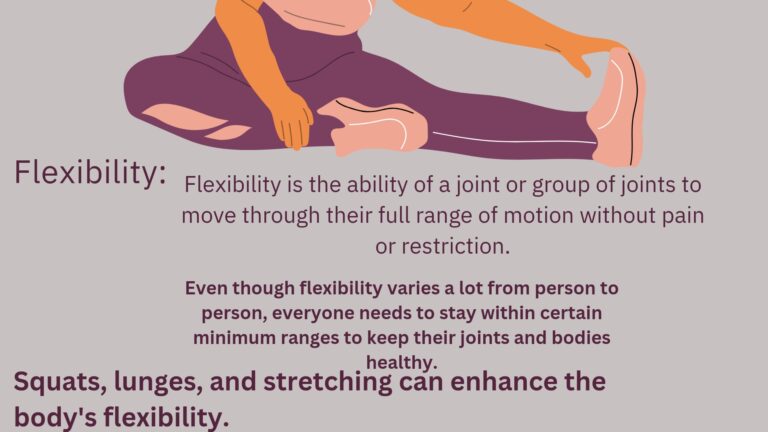Let’s Trim the Midsection: Top 5 Fitness and Wellness Hacks
Achieving and maintaining a healthy
Introduction:
Achieving and maintaining a healthy midsection is a common fitness goal for many individuals. While there’s no magic solution, implementing a combination of effective fitness and wellness hacks can significantly contribute to toning and trimming this area. In this guide, we’ll explore the top five fitness and wellness hacks that target the midsection, providing actionable steps and insights to help you on your journey toward a stronger, more toned core. These hacks incorporate a holistic approach, combining exercise, nutrition, lifestyle adjustments, and mindfulness techniques to support your goal of achieving a healthier midsection. Whether you’re aiming for defined abs or simply looking to improve your core strength, these strategies will assist you in your fitness and wellness endeavors.
Understanding the Importance of a Balanced Diet
A balanced diet plays a pivotal role in maintaining overall health and well-being. It refers to consuming a variety of foods that provide essential nutrients in appropriate proportions to support bodily functions, energy levels, and optimal health. Here’s a breakdown of why a balanced diet is crucial:
- Nutrient Intake: A balanced diet ensures the intake of essential nutrients such as vitamins, minerals, proteins, carbohydrates, fats, and fiber. Each nutrient has a specific role in the body, contributing to various physiological functions, including growth, repair, energy production, and immune system support.
- Weight Management: Eating a balanced diet helps in managing weight effectively. It prevents excessive calorie intake, promotes satiety, and encourages the consumption of nutrient-dense foods over empty calories, thus aiding in weight control and reducing the risk of obesity-related conditions.
- Disease Prevention: A well-balanced diet lowers the risk of developing chronic diseases such as heart disease, diabetes, hypertension, certain cancers, and osteoporosis. Nutrient-rich foods contain antioxidants and phytochemicals that protect the body from oxidative stress and inflammation, reducing the likelihood of these illnesses.
- Energy and Performance: The right balance of nutrients provides sustained energy levels necessary for daily activities, exercise, and optimal physical and mental performance. Carbohydrates are the body’s primary energy source, while proteins aid in muscle repair and growth.
- Digestive Health: A diet rich in fiber from fruits, vegetables, and whole grains promotes healthy digestion and prevents constipation. Adequate hydration is also essential for proper digestion and nutrient absorption.
- Mental Health: Research suggests a connection between diet and mental health. A balanced diet, rich in omega-3 fatty acids, vitamins, and minerals, may positively impact mood, cognitive function, and reduce the risk of mental health disorders.
- Longevity: Adopting a balanced diet can contribute to a longer, healthier life by reducing the risk of premature aging and age-related diseases.
In summary, a balanced diet is fundamental for overall health, providing the body with the necessary nutrients for optimal function, disease prevention, sustained energy, and mental well-being. It’s crucial to focus on variety, moderation, and portion control when planning meals to achieve a balanced and wholesome diet.
Optimize Your Workout Routine for Fat Loss

Optimizing your workout routine for fat loss involves a strategic combination of exercises, intensity, duration, and consistency. Here’s a breakdown of key elements to consider when aiming to maximize fat loss through your workout regimen:
- Cardiovascular Exercise: Incorporate both moderate-intensity and high-intensity cardio workouts. Activities like running, cycling, HIIT (High-Intensity Interval Training), and swimming help burn calories and increase metabolic rate, aiding in fat loss.
- Strength Training: Include resistance or weight training exercises in your routine. Building muscle mass contributes to an increased metabolic rate, helping burn more calories even at rest. Compound exercises such as squats, deadlifts, and bench presses engage multiple muscle groups, enhancing calorie burn.
- HIIT Workouts: High-Intensity Interval Training alternates between short bursts of intense exercises followed by brief recovery periods. This method is effective for burning calories during and after workouts, boosting fat loss and improving cardiovascular fitness.
- Circuit Training: Combine strength and cardio exercises in a circuit format to keep the heart rate elevated while engaging different muscle groups. This approach maximizes calorie burn and promotes fat loss.
- Increase Workout Intensity: Gradually increase workout intensity by adding weights, increasing resistance, or shortening rest periods between sets. This challenges the body and boosts metabolism, facilitating fat loss.
- Consistency and Frequency: Aim for regular workouts throughout the week. Consistency is crucial for sustainable fat loss. A mix of cardio, strength training, and rest days ensures proper recovery while maintaining momentum.
- Mindful Nutrition: Pair your workout routine with a balanced diet. Consuming nutritious, whole foods in appropriate portions supports fat loss by providing essential nutrients and controlling calorie intake.
- Rest and Recovery: Ensure adequate rest and recovery between workouts. Overtraining can hinder progress and increase the risk of injury. Quality sleep is crucial for muscle repair, hormone regulation, and overall well-being.
- Track Progress: Monitor your progress by keeping track of workouts, measurements, and changes in body composition. This helps in assessing what works best for your body and making necessary adjustments to your routine.
Remember, individual responses to exercise can vary, so it’s essential to find a routine that aligns with your fitness level, preferences, and goals. Consulting a fitness professional or a certified trainer can provide personalized guidance and support to optimize your workout routine for effective fat loss.
The Magic of Hydration and its Role in Weight Loss
Hydration plays a pivotal role in weight loss and overall health. While it might not be a direct “magic” solution, proper hydration supports several mechanisms that can aid in weight management. Here’s how hydration impacts weight loss:
- Appetite Regulation: Drinking water before meals can promote a feeling of fullness, leading to reduced calorie intake during the meal. Staying hydrated might help control appetite and prevent overeating.
- Metabolic Rate: Adequate hydration is essential for optimal metabolic function. Some studies suggest that drinking water can temporarily boost metabolism, aiding in the burning of calories.
- Calorie-Free Option: Water is a calorie-free beverage, making it an excellent alternative to high-calorie drinks like sugary sodas, juices, or energy drinks. By choosing water over these beverages, you can reduce overall calorie intake, supporting weight loss efforts.
- Workout Performance: Proper hydration is crucial for exercise performance and endurance. During workouts, staying hydrated helps maintain energy levels and prevents dehydration, enabling you to exercise more effectively and burn more calories.
- Water Retention: Paradoxically, staying adequately hydrated can help reduce water retention in the body. When the body senses dehydration, it tends to retain water, leading to bloating. By consistently drinking enough water, the body becomes less likely to retain excess fluids.
- Improved Digestion: Water aids in digestion and the absorption of nutrients. Proper hydration supports a healthy digestive system, preventing constipation and promoting regular bowel movements.
While hydration is an essential component of weight loss, it’s crucial to understand that solely drinking water won’t lead to substantial weight loss on its own. However, integrating proper hydration into a comprehensive weight loss plan that includes a balanced diet and regular exercise can significantly contribute to achieving your weight loss goals.
To maintain adequate hydration levels:
- Drink water throughout the day, aiming for at least 8-10 cups (64-80 ounces) daily, although individual needs may vary.
- Consume water-rich foods like fruits and vegetables.
- Monitor your hydration by paying attention to urine color; pale yellow or clear urine generally indicates good hydration.
In summary, while hydration isn’t a direct weight loss “magic” solution, it plays a supportive role in appetite control, metabolism, exercise performance, and overall well-being, all of which can contribute positively to your weight loss journey when combined with a healthy lifestyle.
Prioritizing Restful Sleep and Stress Management
Prioritizing restful sleep and effective stress management are crucial components of a healthy lifestyle, impacting both physical and mental well-being. Here’s why they are essential, especially in the context of overall health and weight management:
Restful Sleep:
- Hormonal Balance: Quality sleep is crucial for regulating hormones that control appetite (leptin and ghrelin). Poor sleep can disrupt these hormones, leading to increased feelings of hunger and potentially contributing to weight gain.
- Metabolism and Energy Balance: Adequate sleep supports proper metabolic function. Lack of sleep can affect metabolism and energy balance, making it harder to lose weight or maintain a healthy weight.
- Recovery and Repair: Sleep is the body’s time for repair and recovery. Muscles recover, tissues heal, and the immune system strengthens during sleep, aiding in overall well-being.
- Cognitive Function: Good sleep is essential for optimal cognitive function, concentration, and productivity. Lack of sleep can impair decision-making abilities and lead to poor food choices.
Stress Management:
- Hormonal Impact: Chronic stress triggers the release of cortisol, a hormone that, when elevated for prolonged periods, can contribute to weight gain, particularly around the abdominal area.
- Emotional Eating: Stress can lead to emotional eating or cravings for high-calorie, comfort foods, which may negatively impact weight management efforts.
- Sleep Quality: High stress levels can interfere with sleep quality, leading to sleep disturbances or insomnia, creating a cycle that affects both stress and sleep negatively.
- Physical Health: Chronic stress has various detrimental effects on physical health, including increased risk of heart disease, digestive issues, weakened immune function, and more.
Strategies for Improvement:
- Sleep Hygiene: Maintain a consistent sleep schedule, create a relaxing bedtime routine, and ensure a comfortable sleep environment conducive to restful sleep.
- Stress Reduction Techniques: Incorporate stress-relieving activities like mindfulness, meditation, yoga, deep breathing exercises, hobbies, or physical activity into your routine.
- Limit Stimulants: Reduce caffeine intake, especially in the afternoon or evening, as it can interfere with both sleep quality and stress levels.
- Seek Support: Consider professional help from therapists, counselors, or healthcare providers if stress is significantly impacting your well-being.
Prioritizing restful sleep and effective stress management not only supports weight management efforts but also contributes to overall health and a better quality of life. Incorporating these practices into your daily routine can positively impact physical, mental, and emotional health.
Consistency is the Secret Ingredient
Consistency is indeed the secret ingredient when it comes to achieving success in almost any endeavor, including fitness, health, learning, personal growth, and more. Here’s why consistency is so vital:
- Establishing Habits: Consistency helps in forming habits. When you repeatedly perform a behavior or activity, it becomes ingrained in your routine, making it easier to maintain over time.
- Progress Over Time: Consistent effort leads to gradual progress. Small, regular steps add up and create significant results in the long term, whether it’s in fitness, learning a new skill, or reaching personal goals.
- Maintaining Momentum: Consistency helps maintain momentum and prevents regression. Regular action keeps you on track and prevents setbacks that might occur if you sporadically engage in activities.
- Building Discipline: Consistency builds discipline and commitment. It teaches you to show up even on days when motivation is lacking, fostering resilience and determination.
- Improving Performance: Practicing consistently improves skills and abilities. Whether it’s in sports, work, or personal development, regular practice hones your capabilities, leading to better performance.
- Creating Trust and Reliability: Consistency builds trust, not only with others but also with yourself. When you consistently deliver on your commitments, it instills confidence and reliability.
- Developing Long-Term Sustainability: Consistency fosters a sustainable approach. It’s not about drastic changes for a short period but about creating lasting habits that contribute to a healthier and more fulfilling lifestyle.
- Mindset Shift: Consistency often leads to a shift in mindset. Over time, it changes how you perceive tasks, making them less daunting and more manageable, thus encouraging further consistency.
- Self-Improvement: Consistency encourages self-improvement and personal growth. Whether it’s learning, exercise, or any other goal, consistent effort leads to continuous development.
To harness the power of consistency:
- Set realistic and achievable goals.
- Create a schedule or routine that fits your lifestyle.
- Focus on progress, not perfection.
- Stay adaptable and resilient in the face of challenges.
- Celebrate small wins and milestones along the way.
Remember, while consistency is crucial, it’s also essential to allow yourself flexibility and grace. Consistency doesn’t mean perfection. Embrace the journey, stay committed, and keep moving forward towards your goals.
Conclusion
In the pursuit of a healthier and more fulfilling life, incorporating consistency across various facets is the cornerstone of progress and success. Whether it’s in fitness, nutrition, learning, personal growth, or any other endeavor, the power of consistency cannot be overstated.
Consistency breeds habits, and habits shape our lives. By consistently showing up, making efforts, and staying committed to our goals, we create lasting changes that lead to remarkable transformations over time.
Remember, it’s not about making massive changes overnight but rather about taking small, consistent steps towards improvement. Celebrate the journey, acknowledge the progress made, and stay resilient in the face of challenges.
Embrace the rhythm of consistency as it molds discipline, builds resilience, and fosters personal growth. With dedication, perseverance, and a commitment to consistency, you can achieve the changes you seek and create a life filled with purpose, wellness, and fulfillment.
May the journey of consistency be your guiding light towards reaching your aspirations and living your best life. Stay consistent, stay determined, and keep moving forward toward your goals.







